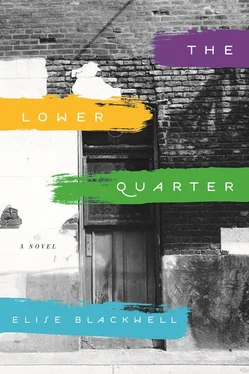She remembered the last time she had tried to register for classes, the small anger and large embarrassment of being told by some sorority girl with a work-study job and perfectly straightened hair that there would be no degree in her future if she didn’t clear her bills. She didn’t have enough to pay her library fines, much less tuition.
“The only amends you can make to me is to give me the money that should have been mine. We didn’t have much of a legacy, but we had that. You had that. I’ve had to work my ass off. You could have gone to college if you’d wanted to. I actually wanted to. I tried.”
Henry straightened himself out of his slouch. He looked thinner than he had in her doorway but not junkie skinny, which meant he might be telling partial truth. “Yes, okay,” he said, nodding, “I’m working on that. It’s going to take a while for me. I’m on my feet now, not much more, but here’s a start.” He handed her an envelope, clean, white, and sealed. “It’s a couple of hundred. It’s a start. It’s why I came here even though I knew you wouldn’t want to see me.”
She wondered if he expected her to turn it down. If he did, he was deluded. She tucked the envelope under her thigh. “Okay, then,” she said. “Thanks. You can go now.”
“Marion, we’re the only family each other have. Meager for you, maybe, but it’s nice to be connected to something in the world. You can’t just pretend you’re nobody from nowhere.”
She resented him for hitting her in the one place she was vulnerable. Of course that one place was everything, was her: She was alone in the world. Her only friends, if they could even be called that, were her tattoo artist and a guy she’d met online and hooked up with for kinky sex. She barely knew either of them, not really, and she hadn’t even made a real friend at work. She’d never been an extrovert, never been the life of the party, but she’d had friendships before. If not friendships, then at least people she’d hung out with, a group to be a part of.
She shrugged. “I don’t know about that. I think that’s what New Orleans is good for. You don’t even have to pretend. You can just be nobody from nowhere, and this place will take you.”
He palmed his knees, still holding his posture straight, and tried out a smile that didn’t quite stick. “Maybe I’ll come to see that.”
“You’re staying in town?”
“For a while, yes. I’m going to try to get some construction work. There’s going to be a lot of it, so I don’t think they’ll be too picky about who does it.”
Marion shifted her weight, burrowed into the chair more deeply, hearing the artificial sound of its beads as they rubbed against each other, feeling a sharp corner of the envelope of money in the back of her thigh. “You can’t stay here. Even if I was okay with that, I don’t have room.”
“I’d like to stay here, even sleep on the couch, but I know that I can’t even ask that.” To his credit, he stood to go. “Anyway, I have a crew of sorts here, and we find places to stay. It’s a good town for that these days. Lots of empty buildings.”
“Look, you caught me in the middle of trying to work.” She found a notepad and a pen and wrote down her phone number. “Give me a call later this week, or even tomorrow, and maybe you could come by for dinner or something.”
He moved to hug her, her hand and the paper caught awkwardly between them, before taking the paper with her number. She felt something inside shift and decided not to examine it.
“You have paint on your hands,” he said, pointing. “Show me?”
“Sure,” she said, and he followed her back through the kitchen to the third and final room of the barrel of her place.
He looked at her landscape-in-progress for a long time without speaking, then said, “See, you aren’t nobody from nowhere. You’re somebody from somewhere.”
Tears welled in her eyes, but she willed them to subside and muttered, “Whatever.”
“Not ‘whatever,’ Marion. It matters.”
“No,” she said, “because where we’re from doesn’t even exist anymore.”
Now he managed a smile he could hold. “I’m looking at it right now.” He punched her lightly on the arm, like he used to when he was in high school and she was in middle school, an affectionate joshing that marked the only moments she could remember him feeling to her like an older brother — the way older brothers were supposed to be.
She tried to count the times it had happened and found that she could, because she only had to get to four. This time made five, but now felt too late.
Johanna
Clay had wanted to walk her back to her workshop, but she had insisted on saying good-bye in Jackson Square, sending him uptown while she walked the few blocks down. A few blocks wouldn’t have made a difference, but she preferred to walk alone. He had asked if she was embarrassed to be seen with him. She wasn’t sure if he meant because of the way he walked or because he was obviously rich, even when he tried to dress like everyone else, which he never got quite right. In either case, he was wrong. She didn’t care what other people saw, what other people thought of her. She just wanted to be alone.
She passed a gutter-punk couple huddled under an awning with five dogs. The woman thrust a paper cup at her, mumbling something about pet food, and Johanna was happy that the little dog she had cared for had better luck in life than these dogs lying on wet concrete.
Ignoring her studio, Johanna went straight upstairs. It was the first time since the previous winter that she had turned on the heat, and the smell of dust came through the vents after she turned the plastic dial on the thermostat.
She unwrapped the painting and sat cross-legged on the sofa, looking down at the canvas, peering at the face of the young woman waiting to leave Belgium for a better life. Perhaps it was Elizam who had allowed her to say what she always felt: The painting belonged to her. Clay might say that she had earned it, but that idea was disgusting to her. It was simple: The painting belonged to her in a way that did not need to be explained. Unlike the little dog, this small thing had no one else suitable to care for it. She had restored it, she loved it, it was hers.
Her thoughts were interrupted by the bell downstairs, and she was alarmed by the idea that she’d gone upstairs without locking the door — something she had never done before. She descended the steps, pepper-spray canister in her loose fist, to find a couple standing awkwardly in her studio. She knew right away who they were. What surprised her most about this was that she’d had any expectations about them at all, but, then, of course she had: She had heard their voices and had entered their work.
Both were tall, thin, and stylish — the kind of people others looked at when they entered a room or just walked down the street, in part because their bearing and clothing requested attention. The woman was almost a great beauty with her dark hair and fair skin, but her thinness gave her face a drawn quality, her mannerisms were flighty and nervous, and the red coat she had on seemed to wear her. He was more comfortable in his clothes, more certain he was entitled to the space his body occupied. This made sense from their work.
When Johanna showed them what she had done so far, he told her it was more than he’d expected. Only the woman seemed disappointed, but Johanna was not sure if it was due to the incomplete restoration — which Johanna refrained from telling her was due at least in part to her choice of inferior materials — or some sense of her work as less accomplished than she had remembered it.
The painting upstairs interfered with Johanna’s concentration — she did not like to leave it out — but she did her best to report on her progress and her plans for additional steps.
Читать дальше












